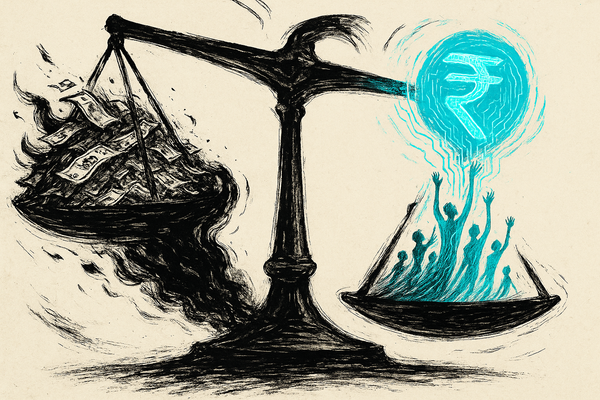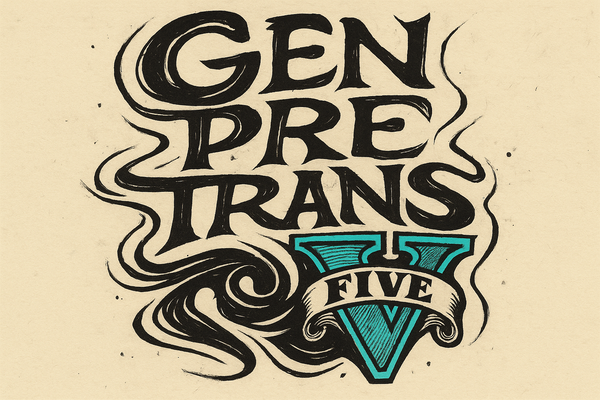ImaginEconomy Daily #19
Excerpt: Adobe transforms PDFs into AI conversation hubs. AI models bet real money, outperform markets. 95% of corporate AI pilots fail on wrong focus. Swift's "Showgirl" sparks 16-hour brand campaigns.

ImaginEconomy 🧠 ✨ 💰 : Brands, Strategy, Story and Design in the Age of AI
Adobe Acrobat Studio Transforms PDFs into AI Conversation Hubs
Adobe launched Acrobat Studio on Monday, combining AI agents with PDFs to create "PDF Spaces" where teams can upload up to 100 files and chat with documents in real-time. The platform transforms collections of PDFs, web pages, and Office files into conversational knowledge hubs, with AI Assistants that can take on roles like "instructor" or "analyst" to synthesize information. Users can share entire PDF Spaces with customized AI Assistants, ensuring teams interact with the same knowledge base. The service includes Adobe Express Premium for content creation and competes directly with Google's NotebookLM, which gained traction with students and researchers for similar features.
ImaginEconomy Impact: Adobe just turned the world's most boring file format into a strategic weapon. While competitors chase chatbot features, Adobe recognizes that documents aren't just static containers but organizational memory. For brands managing hundreds of strategy decks, research reports, and creative briefs, PDF Spaces solves the institutional amnesia problem: knowledge trapped in files nobody can find. This isn't about making PDFs smarter but about making organizations more intelligent by turning their document graveyards into living intelligence systems.
Source: Adobe News
Prophet Arena: AI Models Place Real Money Bets, Outperform Markets
University of Chicago launched Prophet Arena, a platform where AI models compete in live prediction markets with real money on the line. The system evaluates AI forecasting ability through actual betting decisions, with some models achieving 9x returns on underdog bets. OpenAI's o3-mini currently leads the leaderboard, earning $9 on a $1 bet for correctly predicting Toronto FC's upset victory over San Diego FC when the market gave Toronto only 11% odds. Models show distinct risk personalities: Qwen 3 aggressively assigns 75% probability to events the market prices at 25%, while Llama 4 Maverick stays conservative at 35% for the same events.
ImaginEconomy Impact: Forget focus groups and sentiment analysis: the future of market research is AI models with skin in the game. Prophet Arena reveals that different AI models have distinct judgment styles, risk tolerances, and interpretation biases, just like human analysts. For strategists, this means AI isn't just a tool for similar predictions but a diverse panel of advisors with verifiable track records. The platform's finding that models lose more often than they win but still profit overall mirrors successful investment strategies: it's not about being right most often, but being right when it matters most.
Source: Prophet Arena
MIT Study: 95% of Corporate AI Pilots Fail Due to Wrong Focus
MIT's NANDA initiative reveals that 95% of enterprise AI pilots deliver zero impact on profit and loss, despite $30-40 billion in corporate investment. The research, based on 150 interviews and analysis of 300 deployments, found companies waste over half their AI budgets on sales and marketing tools when back-office automation delivers the highest ROI. Successful implementations come from purchasing specialized vendor solutions (67% success rate) rather than building in-house (33% success rate). The 5% of companies seeing rapid and concrete returns focus on one specific pain point, execute well, and partner with specialized providers rather than attempting broad transformations.
ImaginEconomy Impact: The MIT study exposes AI's dirty secret: it's not a creativity amplifier but a bureaucracy killer. While CMOs chase shiny chatbots for marketing and customer engagement, the real returns hide in unsexy back-office corners where the sun don't shine: eliminating outsourcing, automating compliance, and streamlining operations. The message for brand leaders is counterintuitive: stop trying to make AI creative and start making it boring. The companies winning with AI aren't revolutionizing customer experience; they're quietly automating the tedious work that nobody wanted to do anyway.
Source: Fortune
Taylor Swift's "Life of a Showgirl" Sparks Brand AI Reaction Speed Test
Taylor Swift's album announcement triggered an unprecedented brand response marathon, with Panera creating a complete campaign including merchandise in just 16 hours after the star mentioned sourdough on the New Heights podcast. Over 2,600 social posts flooded platforms within 72 hours of the announcement, with brands from FedEx to Olive Garden instantly adopting the album's orange-and-turquoise color scheme. Panera's "Loaf Story" campaign, featuring sweatshirts reading "In My Sourdough Era," sold out in under three hours and earned 500 million impressions. The campaign was part of 72andSunny New York's "reactive playbook" strategy, allowing the brand to capitalize on cultural moments within hours rather than weeks.
ImaginEconomy Impact: Swift's Showgirl era just revealed the new creative brief: speed beats perfection. Brands that succeeded weren't the ones with the best ideas but the fastest reflexes. Panera's 16-hour turnaround from podcast mention to purchasable product sets a new benchmark for cultural responsiveness. This isn't trend-jacking; it's trend-sprinting, where pre-approved creative frameworks and AI-assisted production let brands move at meme speed. The winners understand that in attention economics, being second with quality loses to being first with good enough.
Source: Adweek
Meta Creates "SuperIntelligence Labs" in Latest AI Org Restructure
Meta split its newly formed Superintelligence Labs into four specialized groups on Tuesday, marking the company's fourth AI restructuring in six months. The division creates TBD Lab (foundation models under Scale AI's Alexandr Wang), FAIR (fundamental research), Products and Applied Research (consumer integration under former GitHub CEO Nat Friedman), and MSL Infra (infrastructure). The restructuring comes as Meta races to compete with OpenAI and Google DeepMind after CEO Mark Zuckerberg admitted falling behind in April. The company has been aggressively poaching talent with multi-million dollar packages and is simultaneously considering licensing third-party models rather than relying solely on its open-source Llama approach.
ImaginEconomy Impact: Meta's musical chairs approach to AI organization reveals that nobody yet knows how to structure for superintelligence. Four reorgs in six months isn't strategy but panic. And while Zuck is known for moving and correcting fast, it signals that even tech giants are making it up as they go. For brand strategists, Meta's chaos is instructive: the companies winning in AI aren't the ones with perfect org charts but those with clear use cases. While Meta shuffles executives, smaller companies with focused AI applications are quietly eating at least some of their lunch.
Source: Bloomberg
OpenAI Plans ChatGPT Encryption for "AI Privilege"
Sam Altman reveals OpenAI is "very serious" about adding encryption to ChatGPT, starting with temporary chats, as users increasingly share sensitive medical and therapy conversations without legal confidentiality protections. Currently, ChatGPT conversations can be subpoenaed in legal proceedings, unlike doctor-patient or attorney-client communications. OpenAI faces only "double digits" of law enforcement requests annually but expects this to grow, with Altman warning "it will only take one really big case" to force change. The company is exploring solutions similar to Apple's Private Cloud Compute model, where data is processed without human access, though no timeline has been set for implementation.
ImaginEconomy Impact: The absence of "AI privilege" creates a massive liability gap that brands haven't begun to comprehend. Every customer service chatbot, every AI therapist app, every automated advisor is generating legally discoverable evidence that could destroy companies in litigation. Altman's push for encryption isn't about privacy — it's about creating the legal infrastructure for AI to handle real human problems. Until AI conversations have attorney-client privilege equivalent, brands are building features that are simultaneously invaluable and toxic.
Source: Axios
Zapier's Vibe-Coding Framework Powers AI-Driven GTM Teams
Zapier pioneers vibe coding for go-to-market teams, where marketers use natural language to build AI workflows across 8,000+ apps without writing code. The approach allows single marketers to accomplish what traditionally required 10+ specialists, with companies like Remote.com automating 28% of IT requests and Learn It Live reducing support tickets by 40% using AI chatbots built in under an hour. The framework emphasizes maintaining brand voice while scaling content production, using tools like Zapier Agents for complex problem-solving and connecting AI directly to business workflows. Industry observers suggest vibe marketing could shift the $250 billion marketing industry through AI workflow automation.
ImaginEconomy Impact: Vibe coding represents the democratization of technical marketing where talking to AI replaces talking to developers. Zapier's framework solves the core tension in AI-powered marketing: how to scale without losing soul. By focusing on brand voice preservation while automating execution, vibe coding lets small teams compete with enterprises not through more resources but better orchestration. This isn't about replacing marketers; it's about turning every marketer into a technical marketer who can ship campaigns at the speed of conversation.
Source: Zapier Blog
Bottom Line: The Credential Economy Takes Shape
Today's stories reveal a market where credentials matter more than capabilities. Adobe doesn't sell PDF features; it sells the authority of being PDF's inventor. Prophet Arena doesn't just test AI; it creates track records that become tradeable reputations. Meta's fourth restructuring in six months isn't building technology; it's building at least the appearance of momentum. As much as Swift's announcement was about music, it was about which brands earned the right to wear orange.
The pattern is unmistakable: in an AI-saturated market, provenance beats performance. MIT's finding that 95% of AI pilots fail while 67% of vendor solutions succeed tells a real story: companies aren't yet buying AI success; they're buying permission to claim AI success. OpenAI's encryption push isn't about privacy but about creating the legal credentials for AI to be trusted with real problems.
The winners in this credential economy understand that AI isn't eliminating human judgment but multiplying the value of human endorsement. When Prophet Arena's AI models achieve 9x returns, they're not just predicting markets; they're creating reputations that become more valuable than their predictions. When Panera moves from podcast to product in 16 hours, they're not just selling bread; they're selling the credentials of cultural fluency.
The ImaginEconomy isn't about what AI can do. It's about what AI is allowed to do. And permission, it turns out, can nbe the scarcest resource in the amplification economy.
ImaginEconomy Daily Newsletter is curated for brand, business and marketing strategists, creatives, and leaders navigating the intersection of technology and human experience.




